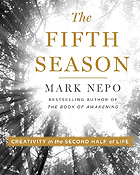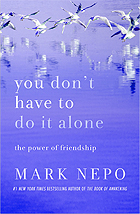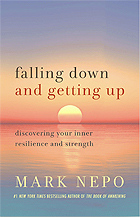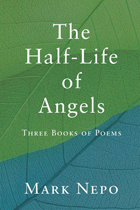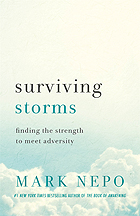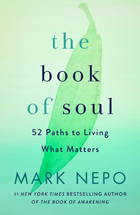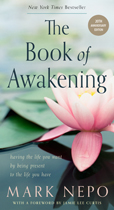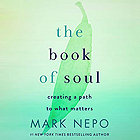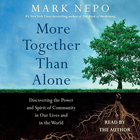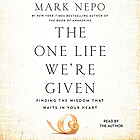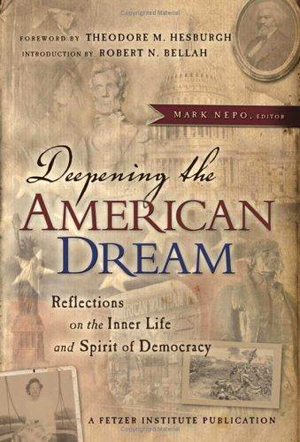| anthologies |  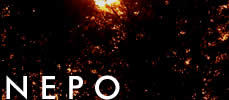  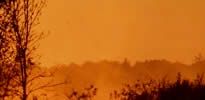 |
|
Deepening the American Dream: MARK NEPO, EDITOR
BOOK DESCRIPTION In the 1830s the French writer Alexis De Tocqueville came to the United States to chronicle the character of this new nation. In Democracy in America he defined and described the “habits of the heart” that vitalized the experiment called America. De Tocqueville found many contradictory qualities in those early Americans and wrote about them with insight. The questions of who we are as Americans and how we are living out the dreams and hopes of our founders are still very much alive for us today. Deepening the American Dream offers a collection of reflections on the spiritual meaning of being American in today’s world from some of our most respected thinkers: Gerald May, Jacob Needleman, Elaine Pagels, Parker Palmer, Robert Inchausti, and others. The book explores the inner life of democracy, the way citizens are formed, and considers the spiritual aspects of the American Dream—life, liberty, and the pursuit of happiness. As a program officer for The Fetzer Institute, I have had the privilege to work with many profound beings around the country on this project and to serve as editor for this book. The project began in 1999, when Rob Lehman, then president and now chair of the board of The Fetzer Institute, wondered about the inner life of democracy and the spirit of true community in today’s world. This led us to gather leading and diverse thinkers together to consider the American Dream in its many incarnations and interpretations, centering on the fundamental questions: As Americans, who are we now? And what is it we dream about and aspire to today? Their in-depth responses form the eight essays in this book.
EXCERPT To keep the experiment alive in our own time, we are being asked to deepen where we look for meaning, to expand the circle in which we share that meaning, and to realize that we are more together than alone. We, at Fetzer, believe that the critical issues facing the world today require that we go below political, social, and economic strategies to the psychological and spiritual roots of those issues. In entering these realms, we are being forced to search for meaning and community beyond our own borders. Finally, we are being asked to consider what the Buddhist monk and writer Thich Nhat Hanh has termed our “interbeing.” For this time, as both Thich Nhat Hanh and the Dalai Lama have said, the Buddha will come as a community, not as an individual. So now, with the press of one interrelated world and the limits of any other way of seeing, we are being asked to imagine, “How can we go there together?” Yet despite our promise and place of power in the world, America has its own internal war of values: to cherish things or people, to consume or preserve, to be self-reliant or interdependent, to isolate or bridge, to lead or listen, to live in fear of the future or to stay in love with the present. Most of all, America has become the pinnacle of a timeless conflict that eventually finds all civilizations: a conflict between supremacy and humility. The question waits inside every human decision: Do we have dominion over the earth, or are we simply part of something larger? In many ways, America has become an efficient, contradictory culture whose over ambitious citizens often aspire to be God-like but whose devotions often manifest as addictions to the material world. All this to say that we have inadvertently built a complex civilization that faces the ocean, though we often live with our backs to the sea. And yet it is a land more free than anyone has ever imagined. In this, America gives rise and refuge to every kind of response to life. At times America reminds me of a jungle. There, everything alive is allowed to grow according to nature's laws. Lush and unruly, the environment gives rise to every kind of flower and weed. There is life at every level: snakes along the jungle floor, monkeys in the thick lower branches that twine into one another, and large birds in the singular reaches that form the tops of trees. And after centuries, the taller trees have formed a canopy. By sheer growth, they have secured the right to drink from the sun's light first, leaving the smaller vines and plants to twist and slink in odd directions to grab their sliver of light. Some of the smaller plants are choked from any light and simply die. Still, the land is so lush and brilliant that all forms of life want to migrate there. At times, it seems that America and its people, with the best of intentions, have grown in this way. For freedom is a different experience for those twisting for their sliver of light than for those privileged trees that form the canopy. Still, accepting how precious a thing freedom is, the question before us, as before the Founding Fathers, remains: What is freedom for? What does one do with complete freedom? Produce and consume? Or root and care for each other? So here we are. Dream-walking on the precipice of everyone's dreams and sufferings, looking for ways to spin the golden threads and bloodied cords into the tapestry of a beloved community. And like it or not, we are becoming the world and the world is becoming us. The borders of the world are strongly and quickly blurring. For example, there are 180 different languages being spoken and published in greater Los Angeles today. Even as I write this, the world is not just being mirrored in the streets of America but spilling into the streets of America. So the question becomes, as the civil rights historian Vincent Harding put it, “How do we prepare ourselves inwardly to participate in the oneness of humanity?” Still, you might ask, why is all this necessary? Let me share an analogy raised by a dear friend and mentor, the physician and painter Joel Elkes. In the wake of September 11, 2001, Joel asked me and others to consider the world as one universal body, and, if this is so, then, he went on, the terrorists and those consumed with self-interest are like cancer cells destroying the whole for the sake of the part. Moreover, he said, we, in our call to find each other and heal each other, are, in every question asked and every suffering heard, cells in the immune system of humanity. By simply gathering and holding space for “the better angels of our nature,” as Lincoln termed it, we preserve the world. It seems an overwhelming task, but to paraphrase Martin Luther King Jr., “I believe what the self-centered have torn down, the other-centered can build up.” And every effort, no matter how small, becomes a healthy cell that matters. And we can start anywhere. Even here.
REVIEWS “Deepening the American Dream communicates
a determined and magnanimous solidarity to a fragmented age of confusion
and escalating resentments. The collection is… a gesture of peace
and goodwill that summons us to come together. It's a powerfully uplifting
book that shines light in the direction of incarnate hope. That rare happening
of people actually talking to each other. I highly recommend it.”
“This thought-provoking volume of essays challenges us to ponder
the American Dream and discuss the spiritual values that can help transform
the country. The interplay between history, spirituality, and current events
is what makes this volume such a soul-stirring experience. It is indeed
hopeful and salutary that this cultural document puts so much emphasis
on spiritual values as being crucial to the health and enduring value of
democracy in the twenty-first century.”
“Reading through the essays collected in this book is a feast for the citizen
as well as a feast for the soul.”
”This important book brings together some of the most creative
thinkers in the nation to look beyond the troublesome reality of
our time and to imagine a bold new way of thinking and living.
It challenges us to cross the boundaries which keep us apart, and
points, inspiringly, to a future which unites us with all human
beings. As editor, Mark Nepo conveys the poetry, grace, and wisdom
of his earlier work.”
“By reading these thoughtful essays and reflecting or asking
your own questions in the course of your day, you will contribute
to bettering the world we leave for our children.”
An important and soul-stirring work on the spiritual values that
can enable the American Dream to once again flourish and prosper. |



|
